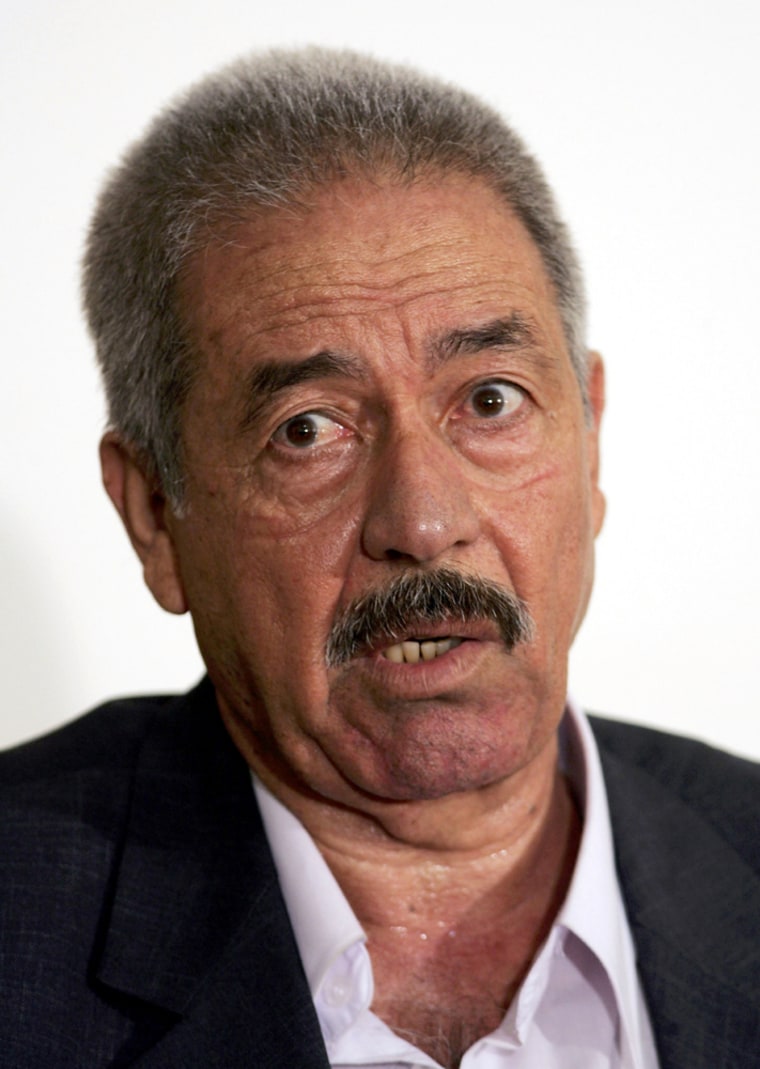The former general known as “Chemical Ali,” notorious for allegedly gassing thousands of Kurds, looked haggard and leaned on a cane in a court Saturday as Iraq’s U.S.-backed government speeded the pace of legal proceedings against Saddam Hussein’s henchmen before next month’s critical elections.
The appearance of both Ali Hassan al-Majid and Saddam’s last defense minister Gen. Sultan Hashim Ahmad before a tribunal of judges were the first in a series of interrogatory hearings that were made public, in preparation for eventual full trials of Iraq’s one-time leaders. The session was closed to the press.
Al-Majid appeared haggard in a video released after the interrogation. The gray-haired first cousin of Saddam leaned on a walking stick before sitting in front of a judge behind a desk.
Ahmad stared blankly at the ground as police officers stood on either side of him holding his arms. Ahmad, a thickly set man with black mustache, later smiled broadly to others in the hearing room.
Anfal campaign, bloody quelling of 1991 uprising
A defense lawyer who attended the hearings said Ahmad spent four hours at the tribunal, with the questions focused on charges regarding attacks on Kurds and the Anfal campaign, a depopulation scheme that killed and expelled hundreds of thousands of Kurds from northern Iraq during the 1980s. Ahmad is said to have led the Iraqi Army’s 1st Corps into the Anfal campaign.

“I have been a military officer for 40 years and have never been punished. It’s unfortunate that I have to sit like this before the court with the Americans sitting behind me,” Ahmad told the judge, according to the lawyer, who declined to be identified.
U.S. Embassy spokesman Bob Callahan declined to say if American officials were present.
Interim Iraqi Prime Minister Ayad Allawi said Tuesday that detained Saddam regime figures would start appearing before court in the coming week — pressing ahead with the trials ahead of crucial national elections set for Jan. 30.
The timing was apparently to remind voters of the brutality they endured before the Americans ousted the dictatorship. The Iraqis will vote for a transitional assembly that will write a permanent constitution.
Gathering evidence for eventual trials
The videos were the first images of the men since their arraignment in July along with Saddam and the other detainees. Both wore gray-colored suits and white shirts without ties and arrived at the tribunal handcuffed and flanked by blue uniformed police.
They are the first known to have gone before an investigative hearing from among the 12 jailed top figures who, including Saddam, are facing trial for crimes during the regime’s three decades in power.
Both were questioned by a panel of investigative judges in a hearing attended by their lawyers, said Raad al-Juhyi, the head of the panel.
The role of the judges during these hearings is to interrogate the detainees and gather evidence for possible charges to be laid against them, including Saddam, followed by eventual criminal trials.
Al-Juhyi said the defendants will face questioning over Saddam’s Anfal campaign, a depopulation scheme that killed and expelled hundreds of thousands of Kurds from northern Iraq during the 1980s. The offensive includes the 1988 Halabja chemical weapons attacks that al-Majid has been accused of ordering.
The judges will also investigate the role of the detainees in the bloody quelling of a 1991 Shiite uprising following the U.S.-led Gulf War to force occupying Iraqi forces out of neighboring Kuwait, plus the illegal imprisonment and executions of political opponents.
No rush to trial
Al-Juhyi stressed the proceedings were only initial hearings to gather information, not trials, adding there would be no rush to bring to trial Saddam and his aides.
“Hastiness is the plague of trials,” he said.
An official familiar with the procedure said the hearings are expected to continue Monday and involve a third detainee, whose identity was not revealed.
Iraqi deputy prime minister, Barham Saleh, told Al-Arabiya TV that Ahmad was being quizzed primarily to assist in tribunal proceedings against al-Majid.
“The former defense minister is being interrogated within the framework of focusing on the case of Ali Hassan al-Majid, who is accused of many crimes against the Iraqi people,” Saleh said, adding that any future criminal trial would be public.
Many Iraqis — particularly among the Shiite majority — have been eager to see the prosecution of the ousted regime begin.